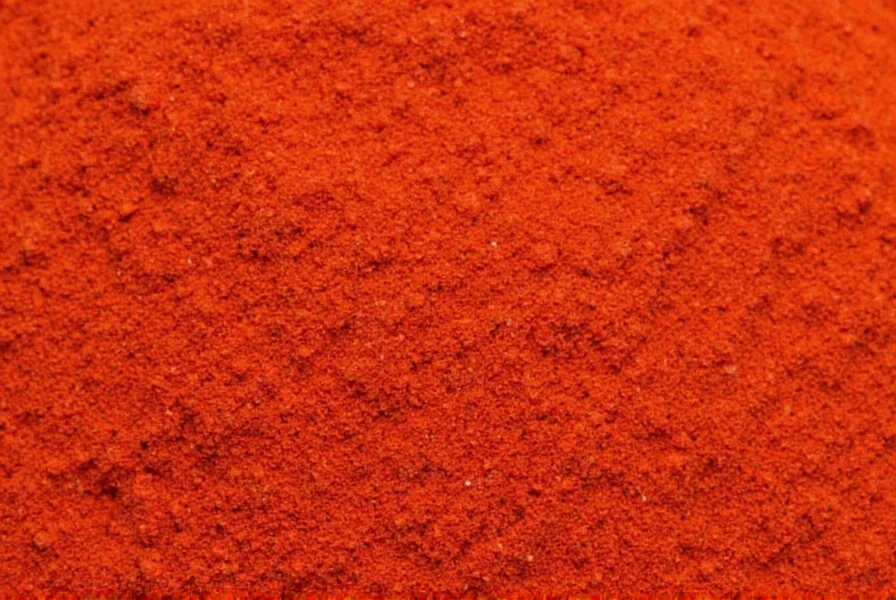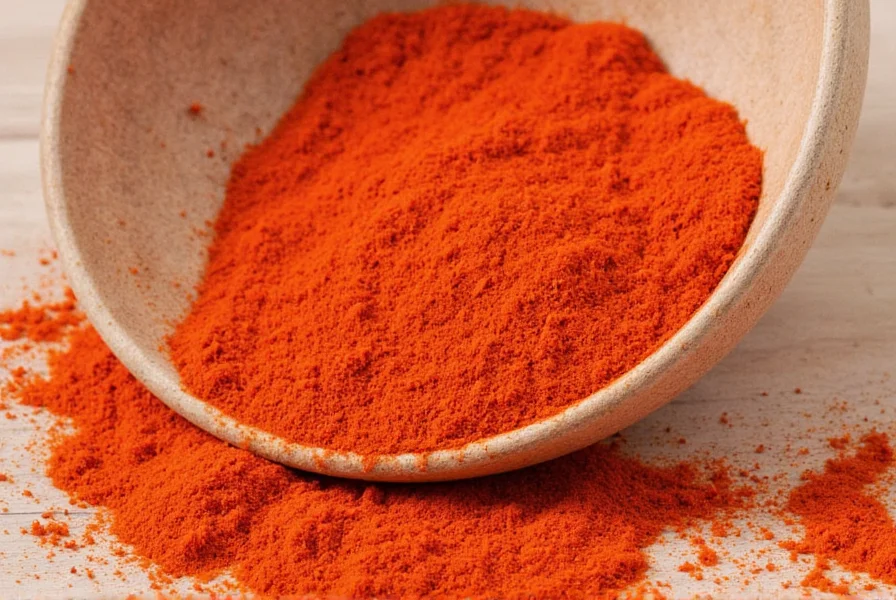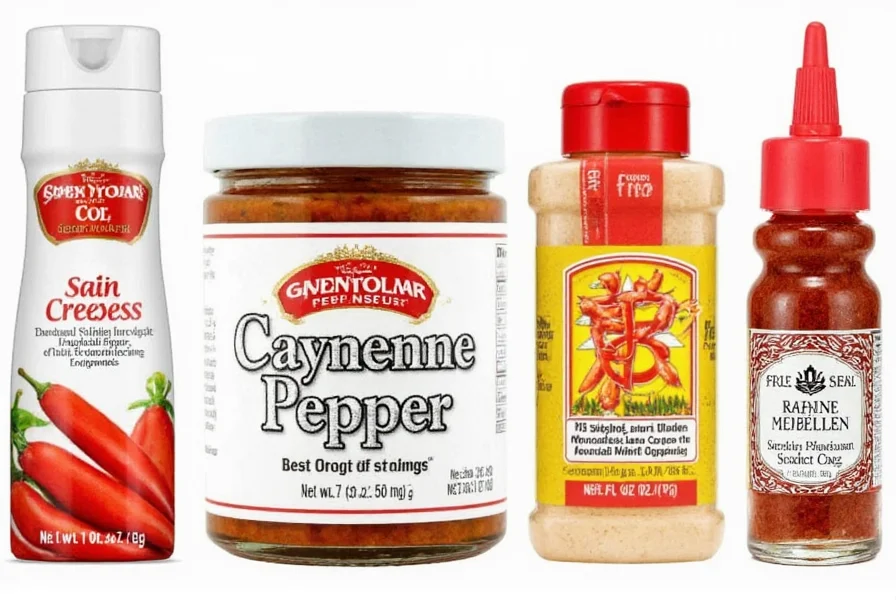Running out of cayenne pepper doesn't have to ruin your cooking plans. Whether you're preparing Cajun cuisine, adding heat to sauces, or making homemade spice blends, knowing effective cayenne pepper substitute options keeps your culinary projects on track. This guide provides practical alternatives backed by flavor science and cooking experience.
Why You Might Need a Cayenne Substitute
Cayenne pepper, with its distinctive heat (30,000-50,000 Scoville units) and slightly fruity flavor, appears in countless recipes worldwide. You might need alternatives when:
- You've exhausted your spice supply mid-recipe
- Someone in your household prefers milder heat levels
- You're accommodating dietary restrictions or sensitivities
- Seeking different flavor dimensions while maintaining heat
Heat Level Comparison of Common Substitutes
| Substitute | Scoville Units | Heat Relative to Cayenne | Flavor Profile |
|---|---|---|---|
| Cayenne Pepper | 30,000-50,000 | 1x (baseline) | Sharp, bright, slightly fruity |
| Crushed Red Pepper Flakes | 15,000-25,000 | ½-⅔ strength | Earthy, slightly smoky |
| Hot Paprika + Pinch Cayenne | 500-1,000 + adjustable | Adjustable | Sweet, smoky, customizable heat |
| Chipotle Powder | 2,500-8,000 | ⅕-¼ strength | Smoky, earthy, complex |
| Black Pepper + Red Pepper Flakes | Variable | Mild | Pungent, warm, subtle heat |
Top 5 Practical Cayenne Pepper Substitutes
1. Crushed Red Pepper Flakes (Best All-Around Substitute)
Crushed red pepper flakes make the most versatile cayenne pepper substitute for recipes. While slightly milder, they deliver comparable heat with earthier notes. Use a 2:1 ratio—½ teaspoon flakes replaces ¼ teaspoon cayenne. For best results, crush flakes slightly between your fingers before adding to release essential oils. This cayenne pepper substitute measurements approach works perfectly in pasta sauces, pizza, and stir-fries.

2. Paprika Blend (Controlled Heat Alternative)
When you need to manage heat levels precisely, combine 1 teaspoon sweet paprika with ⅛ teaspoon cayenne (or red pepper flakes) as your cayenne pepper substitute. This approach gives you paprika's rich color and base flavor with adjustable heat. Ideal for dishes where overwhelming heat would dominate, like deviled eggs or potato salad. For a mild cayenne pepper alternative, omit the additional heat element entirely.
3. Chipotle Powder (Smoky Dish Substitute)
For barbecue sauces, chili, and southwestern recipes, chipotle powder serves as an excellent cayenne pepper substitute with added dimension. Use ¾ teaspoon chipotle powder for every ¼ teaspoon cayenne. The smoky undertones complement meats and beans beautifully, though the heat level runs milder. This substitution works particularly well when seeking a cayenne pepper substitute for recipes with tomato bases.
4. Black Pepper with Red Pepper Flakes (Mild Heat Option)
When someone prefers a milder cayenne pepper alternative, combine freshly ground black pepper with a small amount of red pepper flakes. Try ½ teaspoon black pepper plus ⅛ teaspoon red pepper flakes to replace ¼ teaspoon cayenne. The black pepper provides pungency while the flakes add subtle heat. This combination works well in creamy sauces, soups, and dressings where intense heat would overwhelm delicate flavors.
5. Fresh Hot Peppers (For Authentic Heat)
When available, fresh jalapeños (2,500-8,000 Scoville) or serranos (10,000-23,000 Scoville) make excellent cayenne pepper substitutes. Finely mince 1 teaspoon jalapeño (seeds removed) to replace ¼ teaspoon cayenne. For hotter dishes, use serranos at a ½ teaspoon to ¼ teaspoon cayenne ratio. Always wear gloves when handling hot peppers and wash hands thoroughly afterward. This fresh cayenne pepper substitute option adds moisture to dishes, so reduce other liquids slightly.
Recipe-Specific Substitution Guide
Not all cayenne pepper substitutes work equally well in every dish. Consider these recommendations when choosing your alternative:
- Spicy Mayo/Sauces: Use chipotle powder for smoky depth or paprika blend for controlled heat
- Chili/Stews: Crushed red pepper flakes provide consistent heat throughout cooking
- Baking (Spice Cakes): Paprika blend maintains color without overwhelming heat
- Marinades: Fresh minced jalapeños distribute heat evenly in meat dishes
- Seafood Dishes: Mild black pepper/red flake combination enhances without overpowering
Measurement Conversion Tips
Accurate cayenne pepper substitute measurements prevent ruined dishes. Follow these guidelines:
- Always start with less heat—you can add more, but can't remove excess
- When substituting crushed red pepper flakes for cayenne, use ⅛ teaspoon increments
- For paprika blends, add heat gradually after incorporating the base spice
- Remember that heat intensifies as dishes cook—add substitutes toward the end for brighter heat
- Dairy products (yogurt, cream) can counteract excessive heat if substitutions go wrong
What to Avoid When Substituting
Some common cayenne pepper substitute mistakes can compromise your dish:
- Using pure chili powder: Most commercial blends contain cumin and garlic, altering flavor profiles
- Substituting habanero powder: At 100,000-350,000 Scoville, it's 7-10x hotter than cayenne
- Ignoring recipe chemistry: Acidic ingredients can intensify perceived heat
- Overcompensating: Adding multiple substitutes creates unbalanced heat
- Using old spices: Stale substitutes lose potency and develop off-flavors

Final Considerations for Perfect Substitutions
The right cayenne pepper substitute depends on your specific recipe requirements and personal heat tolerance. Always consider both the heat level (Scoville units) and flavor profile when selecting alternatives. For best results, keep multiple substitute options in your pantry to handle various cooking scenarios. Remember that successful substitution isn't just about matching heat—it's about maintaining the intended flavor balance of your dish. With these practical alternatives, you'll never have to abandon a recipe due to missing cayenne pepper again.
Frequently Asked Questions
Can I use paprika instead of cayenne pepper without adding heat?
Yes, sweet paprika makes an excellent mild cayenne pepper alternative when you want color without heat. Use a 1:1 ratio (1 teaspoon paprika for 1 teaspoon cayenne), but recognize you'll lose the spicy element. For dishes requiring some heat, combine 1 teaspoon paprika with ⅛ teaspoon red pepper flakes as your cayenne pepper substitute.
How much red pepper flakes equal cayenne pepper?
Use a 2:1 ratio of crushed red pepper flakes to cayenne pepper. Specifically, ½ teaspoon red pepper flakes substitutes for ¼ teaspoon cayenne pepper. This accounts for the flakes' milder heat (15,000-25,000 Scoville vs cayenne's 30,000-50,000). For best results in your cayenne pepper substitute measurements, crush the flakes slightly before measuring.
What's the best cayenne substitute for creamy sauces?
For creamy sauces like Alfredo or cheese dips, a black pepper and red pepper flake combination works best as a cayenne pepper substitute. Use ½ teaspoon freshly ground black pepper plus ⅛ teaspoon red pepper flakes to replace ¼ teaspoon cayenne. This mild cayenne pepper alternative provides subtle heat without overwhelming the delicate dairy flavors.
Can I substitute fresh peppers for cayenne powder?
Absolutely—fresh jalapeños make an excellent cayenne pepper substitute. Use 1 teaspoon finely minced jalapeño (seeds removed) to replace ¼ teaspoon cayenne powder. For hotter dishes, substitute serranos at a ½ teaspoon to ¼ teaspoon cayenne ratio. Remember this fresh cayenne pepper substitute adds moisture, so reduce other liquids by 1-2 teaspoons per substitution.
Why shouldn't I use regular chili powder as a cayenne substitute?
Most commercial chili powders contain additional spices like cumin, garlic powder, and oregano, which significantly alter your dish's flavor profile. While chili powder has similar heat (5,000-15,000 Scoville), its complex seasoning makes it unsuitable as a direct cayenne pepper substitute. For pure heat replacement, stick with crushed red pepper flakes or paprika blends.











 浙公网安备
33010002000092号
浙公网安备
33010002000092号 浙B2-20120091-4
浙B2-20120091-4